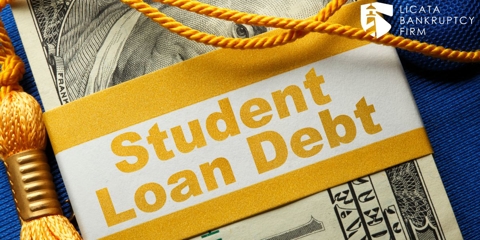Chapter 13 Bankruptcy Attorney in Springfield
Chapter 13 Bankruptcy is designed to offer a financial solution for debtors
that may not meet the income qualifications of a
Chapter 7 or for debtors who are looking for a debt reorganization. There is a misconception
that all debts must be repaid in a Chapter 13 plan.
There are numerous factors that determine the type of bankruptcy plan and
usually unsecured creditors do not get paid in full. The knowledgeable
Chapter 13 bankruptcy attorneys at the
Licata Bankruptcy Firm can advise you if a Chapter 13 is in your best interest and what plan
will meet your financial needs.
An experienced
bankruptcy attorney with focus on only bankruptcy law is crucial for a successful Chapter
13 case. The factors to calculate what must be paid to creditors is always
changing due to new case law, trustee interpretation of statutes, etc.
Staying up to date on recent cases and creditor treatment in your area
will ensure the best possible outcome. A miscalculated plan could lead
to unnecessarily higher plan payments to creditors.
What is Chapter 13 Bankruptcy?
Chapter 13 bankruptcy is designed to relieve debtors of their financial
burdens through reorganization of debt. A discharge of any unpaid debts
is obtained after all plan payments have been made.
These debts include unsecured debts including, but not limited to:
Debtors can also get relief from secured debts they have, for example,
house or vehicle loans they cannot afford, without any deficiency amounts
owed to the creditor after the surrender of collateral. In addition, Chapter
13 plans are useful for paying tax liabilities and child support arrearages
both debts that are generally considered non-dischargeable.
Visit our
bankruptcy lawyer reviews to see why clients choose our law firm when they need the best bankruptcy
lawyers in Springfield, MO.
Filing Chapter 13 Bankruptcy: How Does It Work?
A legal procedure known as Chapter 13 offers people with significant debts
a lifeline by allowing them to reorganize their debt and pay it off over
a three to five-year period.
Filing Fees & Cost
The financial implications of filing for Chapter 13 bankruptcy are significant,
with costs encompassing court fees and attorney charges. Filing for Chapter
13 bankruptcy typically costs around $313, excluding attorney fees which
can vary depending on the complexity of the case. Additional costs may
include a Bankruptcy Trustee fee and mandatory financial counseling course expenses.
Debt Relief & Reorganization
Chapter 13 is essentially a loan that allows debtors to consolidate all
of their debts into a single monthly payment. This payment is sent to
a court-appointed trustee, who afterward allocates the monies among creditors.
This method offers debtors more time to resolve their debts, typically
halting collections and foreclosures and providing much-needed breathing room.
Required Documents
When petitioning for Chapter 13, a variety of documents must be submitted.
It typically consists of comprehensive records of finances which may include
income statements, a summary of assets, a record of living costs, and
a complete list of all creditors and the amounts owed to each. This information
assists the court in understanding how you're doing financially and developing
a repayment plan that matches your ability to pay.
Schedule your FREE initial consultation by
contacting Licata Bankruptcy Firm at
(417) 213-5006 for a Missouri Chapter 13 bankruptcy lawyer.
Benefits of Filing for Chapter 13 Bankruptcy
One of the biggest benefits of a Chapter 13 bankruptcy in Springfield is
the retention of all your property. Debtors will not lose an asset even
if they are non-exempt or not protected by law.
Chapter 7 vs Chapter 13
This is useful if there are things a debtor wishes to keep that they would
otherwise lose in a
Chapter 7 bankruptcy. For example, a luxury item like a boat or motorcycle or even a home that
has equity above the protected amount can be retained in a Chapter 13
bankruptcy.
Chapter 13 bankruptcy is often the best option for debtors who are above
the median, meaning their income is too high to file a Chapter 7 bankruptcy.
This does not mean that you must pay all your unsecured creditors in the
Chapter 13 case.
Bankruptcy Means Test
Your attorney will calculate the
means test for you which determines how much you must pay monthly towards your creditors.
The test is complicated and takes a sophisticated bankruptcy lawyer to
accurately complete.
However, in basic terms assume your household income is $4,000 a month.
Your expenses towards house or lease payments, vehicle payments, taxes,
food, insurance, daycare etc. are $3,800.
Then regardless of the amount of debt you owe, you would just have to pay
$200 a month to satisfy the debt. Chapter 13 plans must go a minimum of
3 years and must complete within 5 years. Your attorney will evaluate
your situation to determine the length of your plan.
Chapter 13 will stop a foreclosure on your home or repossession of a vehicle.
Without a Chapter 13 filing, the creditor will demand full payment of
the amount you are behind for you to retain the property. Chapter 13 will
give you up to 5 years to catch up the amount you are delinquent and stop
the legal action of foreclosure or repossession. You will retain the property
and your first payment to the Chapter 13 trustee will not be due until
30 days after filing your case.
Debt Limit for Chapter 13
An individual whose combined secured and unsecured debts as of the date
of filing for bankruptcy relief do not exceed
$2,750,000 is eligible for chapter 13 relief, regardless of whether he or she is self-employed
or operating an unincorporated business.
11 U.S.C. § 109(e).







